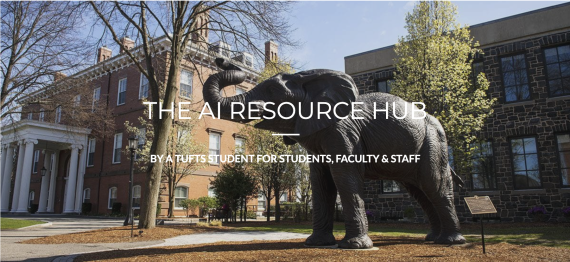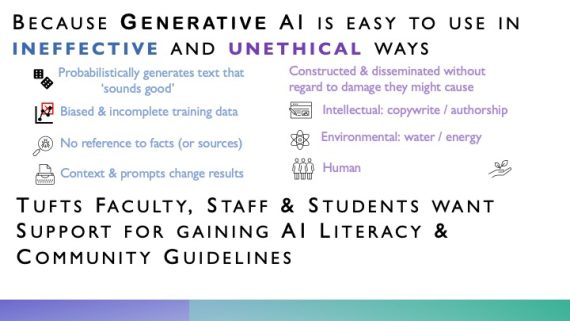Artificial Intelligence Resources for Tufts Faculty and Staff
*This information will continue to evolve and change. Here we define AI broadly as artificial intelligence technologies, with particular emphasis on generative AI tools that create text, images, audio, or code from prompts (e.g, ChatGPT, Claude, Microsoft Copilot, DALL-E, Midjourney, Google Gemini, and Adobe Firefly).
AI is now part of daily life for students and faculty at Tufts. Students use AI for research, writing, and problem-solving, while faculty are experimenting with it for course design, feedback, and their own scholarship. Meanwhile, students are witnessing how AI is transforming the job market, prompting all of us to ask what skills will matter most in the coming years.
This is an opportunity to strengthen what makes Tufts education distinctive: critical thinking, authentic experiential learning, and meaningful human connection. At CELT, we're focused on practical strategies that help faculty integrate AI thoughtfully while maintaining the rigor and values that define learning at Tufts.
Conversations are shifting to "How do we teach effectively & build resilient programs when students use AI daily?" The most productive discussions focus on specific, actionable questions within departments and programs where faculty share common contexts and concerns.
- Curriculum relevance: What skills do our graduates need when AI is standard in their field? How do we update our programs accordingly?
- Assessment integrity: Which assignments still measure what we want them to measure? Where do we need to redesign?
- Learning objectives: Are we teaching students to think critically about AI outputs, not just use AI tools?
- Professional standards: How do disciplinary norms around AI use affect what we teach and how we assess?
Navigating AI in Your Classroom
As AI tools become more deeply embedded in how students learn, communicate, and imagine their futures, “not engaging” isn’t neutrality. It’s a message. And our students are listening. - Demian Hemmel, Ai in the Classroom
As we prepare for the start of a new academic year, the AI landscape is shifting dramatically. National surveys in 2025 report that 90% of students are using AI, often in their coursework and study, while generative AI is becoming increasingly embedded in everyday tools—from Google and Microsoft 365 to PDF readers and writing software. This creates an environment where both faculty and students are working alongside AI capabilities daily.
What can you do?
- Experiment with AI: try out a new AI tool not just to see how well it can perform on your assignments, but to see how it works, perhaps by exploring a hobby or curiosity.
- Learn with your students: Explore how AI is impacting their learning, and what opportunities and challenges you can uncover in the discipline.
- Begin updating courses
- Create & Share Guidelines: Clarify how and when to use (or not use) AI in your course.
- Rethink assessments: Revise assessments to verify they are still valid measures of learning and consider ways to foster critical thinking and authentic learning.
- Reconsider In-Class and Out-of-Class Work: Adapt the course structures to create learning environments resistant to AI misuse.
- Prepare for Conversations about Cheating: Establish a process for evidence-gathering and respectful dialogue, centering relationships with students while upholding academic integrity.
CELT is here to help with any of these steps—from experimenting with tools to redesigning assessments to facilitating department conversations, reach out to celt@tufts.edu.
Support for the Tufts Teaching Community:
- Generative Artificial Intelligence (AI) resources and guidelines for members of the Tufts community interested in leveraging generative AI for research and teaching as well as administrative support.
- Support for AI and Teaching (Tufts Educational Technology Services)
- Developing Syllabus Statements for AI (CELT)
- Designing Courses in the Age of AI (Teaching@Tufts)
- Tufts' AI Resource Hub for students, faculty & staff
- Example assignments from the AI Pedagogy Project
- ChatGPT in Veterinary Medicine: A Practical Guidance of Generative Artificial Intelligence in Clinics, Education, and Research by Candice Chu, Feb 2024
- How to Use GPT-4-o Voice in the University EFL Classroom by Richard Campbell, May 2024
- Student Use Cases for AI by Ethan Mollick at Harvard, Sept 2023
- Instructors as Innovators: A future-focused approach to new AI learning opportunities, with prompts by E.R. Mollick & L. Mollick, April 2024
- Incorporating AI in Teaching: Practical Examples for Busy Instructors by Daniel Stanford, July 2023
- TextGenEd: Teaching with Text Generation Technologies examples from Colorado State, Sept 2023
- Exploring AI Pedagogy a community collection of teaching reflections from the MLA-CCC Joint Task force on AI and Writing
- ChatGPT Assignments to Use in Your Classroom Today from UCF, Oct 2023
- GenAI Chatbot Prompt Library for Educators from AI for Education
- AI Prompts for Teaching by Cynthia Alby
- The AI Pedagogy Project, A collection of resources for educators curious about how AI affects their students and their syllabi from metaLAB at Harvard
- Practical AI for Instructors and Students a video series from Wharton, Aug 2023
- 4 Steps to Help You Plan for ChatGPT in Your Classroom by Flower Darby, June 2023
- Working Paper on Writing and AI by the MLA-CCCC Joint Task Force on Writing and AI, July 2023
- Generative AI and Creative Learning: Concerns, Opportunities, and Choices An MIT Exploration of Generative AI by Mitchel Resnick March, 2024.
- Teaching and Generative AI: Pedagogical Possibilities and Productive Tensions by Beth Buyserie & Travis N. Thurston, 2024
- How AI Chatbots like ChatGPT or Bard Work – Visual Explainer from the Guardian, Nov 2023
- What is Artificial Intelligence? [AI Explained] video by Dr Michael Littman for the NSF, Dec 2023
- A Generative AI Primer by Michael Webb from the National Center for AI, Aug 2024
- What Is AI? A Simple Guide to Help You Understand Artificial Intelligence from the BBC news Jul 2023
- Where are the crescents in AI? By Maha Bali, Feb 2023
- Assistant, Parrot, or Colonizing Loudspeaker? ChatGPT Metaphors for Developing Critical AI Literacies by Gupta, Atef, Mills & Bali, January 2024
- The Algorithm & Data Literacy Project | Understanding Algorithms Workshops, a primer and readings related to data literacy in the AI Era by the Canadian Commission for UNESCO (CCUNESCO) and UNESCO.
- Artificial Intelligence and Information Literacy from the University of Maryland Teaching & Learning Transformation Center
- Don’t Act Like You Forgot: Approaching Another Literacy ‘Crisis’ by (Re)Considering What We Know about Teaching Writing with and through Technologies by Gavin Johnson in Composition Studies 51.1 (2023). https://compositionstudiesjournal.files.wordpress.com/2023/06/johnson.pdf.
- Why We Must Teach AI Literacy in Higher Education by Leo Lo in eCampus News, Dec 2023
- Co-Designing a Risk-Assessment Dashboard for AI Ethics Literacy in EdTech 10 scenarios for engaging with AI ethics in education by Anna Keune
- HE Generative AI Literacy Definition by Sue Attwell, Jul 2024
- A Blueprint for an AI Bill of Rights for Education by Kathryn Conrad July 2023 in Critical AI
- AI Ethics: Global Perspectives - A Collection of Lectures on the Ethical implications of
Data and Artificial Intelligence from Different Perspectives - Beware of Botshit: How to Manage the Epistemic Risks of Generative Chatbots Jan 2024
- How Do We Maintain Academic Integrity in the ChatGPT Era? By Tricia Bertram Gallant in AAC&U’s Liberal Education, winter 2024
- Some Harm Considerations of Large Language Models (LLMs) by Rebecca Sweetman
- Infographic Teaching AI Ethics from Leon Furze’s Teaching AI Ethics: The Series June 2023
- IMPACT RISK: an acronym for AI downsides infographic from from LearnwithAI
- 13 Principles for Using AI Responsibly from the Harvard Business Review, June 2023
- Postplagiarism: Transdisciplinary Ethics and Integrity in the Age of Artificial Intelligence and Neurotechnology by Sarah Elaine, Dec 2023
- The Imperative of Ethical AI Practices in Higher Education by Riccardo Ocleppoin eCampus News, Mar 2024.
- Generative AI and the Problem of (Dis)Trust by Jacob Riyeff, June 2024
- How Generative AI Endangers Cultural Narratives by Kelsey Schoenberg in Issues in Science and Technology, Jan 2024.
- Creating Ethical AI from Indigenous Perspectives Jason Edward Lewis Nov 2023.
- Imagining AI: How the World Sees Intelligent Machines 2023
- Is A.I. the Death of I.P.? by Louis Menard in The New Yorker, Jan 2024
Materials from Past Tufts Events
Spring 2025 Forum - Let’s Talk AI: Navigating Academic, Environmental & Societal Impacts
This event occurred April 4th 2025
Fall 2024 Forum - Let’s Talk AI: Building Awareness and Understanding Together
This event occurred November 21st & 22nd 2024
December 2023 Teaching Symposium: Artificial Intelligence and What it Means for a Tufts Education
Handouts & Recordings
- Slides December 2023 Teaching Symposium
- Keynote Slides Sparking Curiosity: Transforming Teaching & Learning with AI by Dr Cynthia Alby
- Video: Welcome & Keynote Address
- Video: Tufts Student Perspectives on AI
- Video: Faculty Panel
This event occurred on December 12th 2023.
- Could an AI-generated essay get an A? an interview with Tufts faculty & students Feb 2025 (Tufts Daily)
- How AI Intersects With Politics, Jobs, and How We Get Information an interview with Chris Miller, Feb 2025 (Tufts Now)
- Generative AI Tutor Education in Our Writing Center: A Slow Approach Kristina Aikens & Hannah Weildon, Spring 2025, The Peer Review
- The intersection of AI and the downfall of long-form literature by Max Lerner Nov 2024 (Tufts Daily)
- What Will Ai Do to High Education? Hannah Cox, James J. Fisher, & Peter Levine, Aug 2024 eCampus News
- Tufts Faculty Invite AI into the Classroom Mar 2024 (Tufts Now)
- Artificial Intelligence and What it Means for a Tufts Education Keynote Address Sparking Curiosity: Transforming Teaching & Learning with AI by Cynthia J. Alby and Faculty Panel December 2023 Tufts Teaching Symposium Recordings
- Tufts Student Perspectives on AI November 2023 Student Panel
- How to Get the Best Results from ChatGPT by James Intriligator July 2023 (Tufts Now)
- Reconsidering and Revaluing Academic Writing in the Age of AI by Kristina Aikens, StAAR Center, Aug 2023 (Teaching@Tufts)
- What I would advise students about ChatGPT by Peter Levine, Tisch College, Aug 2023
- ChatGPT unmasked at the intersection of computer science and philosophy March 2023 (Tufts Daily)
- AI Keynote Debate: Is ChatGPT Overhyped & Overrated or Underhyped & Underestimated? June 2023 (Tufts University's Gordon Institute YouTube)
- A mistake-find exercise: a teacher’s tool to engage with information innovations, ChatGPT, and their analogs Elena N. Naumova, Friedman, March 2023 (Journal of Public Health Policy)
- Resilient and Equitable Teaching and Assessment Require a Paradigm Shift by Annie Soisson, CELT, January 2023 (Faculty Focus)

